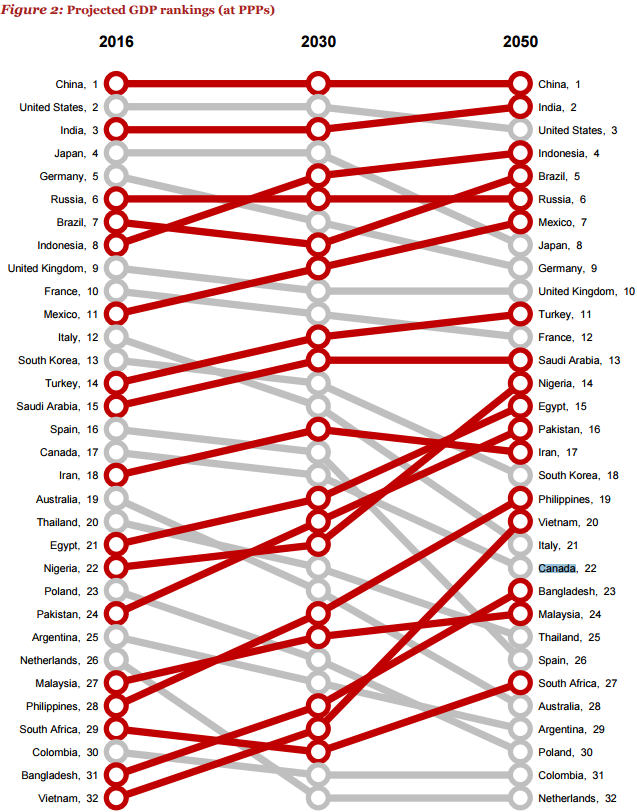Canada’s economy could be overtaken by the likes of Egypt, Nigeria and Pakistan by the year 2050, according to a new report by PricewaterhouseCoopers (PwC).

The report also forecasts that India will usurp the United States as the world’s second largest economy behind China, and that Indonesia, Brazil, Russia and Mexico will occupy slots four through seven as global economic power shifts from the G7 countries to the so-called “E7” emerging economies.
WATCH: How Trump’s presidency could effect the Canadian economy

PwC based its findings on GDP in purchasing power parity terms, which adjusts for price level differences across countries to provide a superior measure of the volume of goods and services produced by an economy.
According to this measure, Canada is the world’s 17th largest economy, but is projected to drop to 18th by 2030 and 22nd by 2050. The slide will not be because of a stagnant or slow-growing GDP, but rather as a result of spectacular expansion on the part of the E7 economies, aided in part by their fast-growing populations.
Just last fall, the Trudeau government’s Advisory Council for Economic Growth suggested that Canada should look to nearly triple its population to 100 million by the end of the century if it wants to remain a major player in the new global order.
Indeed PwC forecasts that the E7 group (China, India, Indonesia, Brazil, Russia, Mexico and Turkey) could be double the size of the G7 (U.S., U.K., France, Germany, Japan, Canada and Italy) by the year 2040, with the reverse being true as recently as 1995.
READ MORE: Canada’s economy will grow more than most G7 countries due to Donald Trump: IMF
However, the emerging economies’ takeover will be contingent on their implementing structural reforms, diversifying their economies and streamlining the workings of political and legal institutions, PwC notes.
Moreover, the report assumes “broadly growth-friendly policies (including no sustained long-term retreat into protectionism) and no major global civilization-threatening catastrophes).”
“After a year of major political shocks with the Brexit vote and the election of President Trump, it might seem brave to opine on economic prospects for 2017, let alone 2050,” wrote John Hawksworth, chief economist for PwC U.K.
READ MORE: How this proposed US tax change could seriously hurt the Canadian economy
But Hawksworth adds that it’s still important that the report take “a longer-term view of global economic prospects that looks beyond the short-term ups and downs of the economic and political cycle,” and focus on the “fundamental drivers of growth,” namely demographics and productivity.
Overall, PwC projects the world economy to more than double in size by 2050, by which point six of the seven largest economies in the world could hail from the E7 economies.





Comments